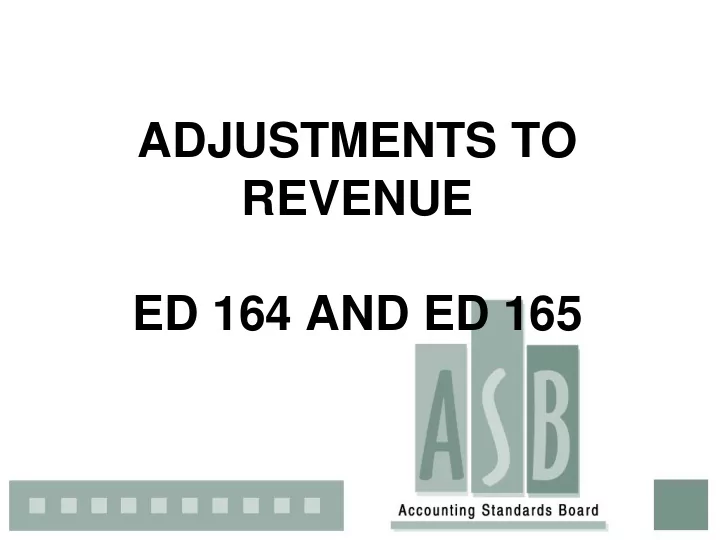

ADJUSTMENTS TO REVENUE ED 164 AND ED 165
Disclaimer The views and opinions expressed in this presentation are those of the individual. Official positions of the ASB on accounting matters are determined only after extensive due process and deliberation . 2
Adjustments to revenue • Proposed IGRAP on Accounting for Adjustments to Revenue (ED 164) - explain how revenue, including interest and penalties, is adjusted following completion of internal or external review, appeal, objection process • Proposed amendments to IGRAP 1 Applying the Probability Test on Initial Recognition (ED 165) - Clarify that entity should consider other factors to assess probability of FEB/SP
Proposed IGRAP on Accounting for Adjustments to Revenue (ED 164)
Background Legislative & regulatory processes govern how revenue is charged – allows for appeal/objection: (a)process established by entity that charged revenue (b)specific legislation or similar means that establishes an appeal and/or an objection process; (c) another legal process; and/or…
Background Entity that charged revenue can also apply own internal policy to assess if revenue charged correctly.
Problem statement • These processes may take some time to complete thus adjustments may be in different reporting periods. • Does adjustment to recognised revenue following outcome of internal or external process result in: (a) error or (b) change in an accounting estimate? • Adjustments to revenue include interest and penalties that arises from recognised revenue
Scope inclusion • Clarify accounting for adjustments to revenue charged ito legislation or similar means • Including interest and penalties that arises from recognised revenue
Scope exclusion • Scope exclusions: – Classification of revenue as exchange or non- exchange – Application of probability test on initial recognition – Assessing whether transaction is undertaken as principal or agent – Accounting for receivables and payables following any adjustments
GRAP 3 guidance Change in an accounting estimate: An adjustment of the carrying amount of an asset or a liability, or the amount of the periodic consumption of an asset, that results from the assessment of the present status of, and expected future benefits and obligations associated with, assets and liabilities
GRAP 3 guidance Error: Omissions from, and misstatements in entity’s f/s for one or more prior periods arising from a failure to use, or misuse of, reliable information that: a.was available when f/s for those periods were authorised for issue; and b.could reasonably be expected to have been obtained and taken into account in the preparation and presentation of those f/s .
GRAP 3 guidance Error includes : effects of mathematical mistakes, mistakes in applying accounting policies, oversights or misinterpretations of facts, and fraud
Errors versus estimates To determine whether an adjustment to revenue charged i.t.o. legislation or similar is a correction of error or change in accounting estimate: – Management needs to apply judgement – Consider new information that becomes known: • entity could not be reasonably expected to know → change in account estimate • entity could reasonably expect to have known and/or that info was incorrect → correction of error
Specific matter for comment Par .13 includes guidance to assist an entity to distinguish between the correction of an error and a change in an accounting estimate following an adjustment to revenue charged in terms of legislation or similar means. (a) In your view, will the clarification in assist an entity to assess whether an adjustment to revenue is a correction of an error or a change in an accounting estimate?
Specific matter for comment (Continue) (b) Are there any other considerations, in addition to par .13, that an entity could consider in distinguishing between the correction or an error and a change in an accounting estimate?
Adjusting for errors An adjustment to revenue (including interest en penalties) is accounted for as an error or prior period error when entity: • has not followed a proper due process to promulgate the tariff, basis, percentage or formula to charge the revenue; and/or • incorrectly applied the tariff, basis, percentage or formula in charging revenue Errors are accounted for retrospectively
Changes in estimates An adjustment to revenue including interest en penalties) is accounted for as a change in an accounting estimate when: • changes occur in the circumstances that led to the recognition of the revenue; or • as a result of new information that becomes known Changes in accounting estimates are accounted for prospectively
Accounting for refunds What about refunds that become payable following the outcome of an internal and/or external process? - Refunds are part of adjustments to revenue → overstatement of revenue recognised - Treated as either an error or a change in an accounting estimate
Proposed amendments to IGRAP 1 Applying the Probability Test on Initial Recognition (ED 165)
Proposed amendments • Initial amount of revenue recognised should reflect all revenue due: – consider obligation to collect all revenue due – other factors that impact entitlement to revenue (new) • What other factors should be considered in assessing probability of FEB/SP – settlement discounts, rebates or similar reductions granted based on satisfaction of certain criteria – legal or other regulatory processes of which outcome will only be known on completion of process – judgement based on past experience and current facts and circumstances
Specific matter for comment The Board proposes amendments to IGRAP 1 to clarify that other factors should be considered in applying the probability test on initial recognition of revenue. Do you agree that the proposed amendments clarify how, and when an entity should consider factors, other than the collectability of revenue, in assessing the inflow of future economic benefits or service potential to the entity?
Transitional provisions • To be applied prospectively • Effective date to be determined by Board
Comment period Comment on ED 164 and ED 165 due 31 August 2018
Submitting comments Visit our website for more information on these Exposure Drafts www.asb.co.za Submit your comments to info@asb.co.za
Recommend
More recommend